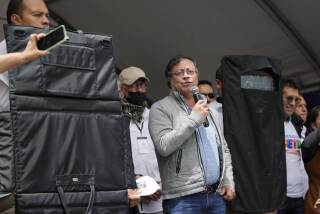Mexico’s High Court Sets Back Genocide Case
- Share via
MEXICO CITY — A special prosecutor seeking the arrest of ex-President Luis Echeverria in the 1971 killings of student protesters lost his first battle in Mexico’s Supreme Court on Wednesday when the justices rejected one of his arguments that it is not too late to bring the former leader to trial.
But the court said it would hold hearings on three other arguments raised by Special Prosecutor Ignacio Carrillo Prieto, who is appealing a lower-court ruling that cited a 30-year statute of limitations in invalidating his case against Echeverria.
The panel’s 4-1 vote Wednesday in Mexico’s most important human rights case was a setback for President Vicente Fox. Elected in 2000, Fox promised to punish the most serious crimes committed by the state during the preceding 71 years of authoritarian rule by the Institutional Revolutionary Party.
Echeverria, 83, is the oldest leader of that era and the only former Mexican president to be indicted for human rights abuse. He has denied the charge, brought in July, that he ordered the 1971 attack by plainclothes government troops on a peaceful anti-government march. The indictment says 45 students died in the attack in Mexico City.
The prosecutor, appointed by Fox, has accused Echeverria and 11 co-defendants of genocide. Whether that crime applies to the killing of a few dozen students is still unresolved.
Another issue, the only one the court debated Wednesday, is whether the prosecutor can rightfully claim that genocide is a crime with no statute of limitations. He based his argument on Mexico’s 2002 ratification of an international treaty to cancel the time limits for prosecuting genocide and other crimes against humanity.
But the panel’s majority upheld the validity of an “interpretation” inserted by Mexican lawmakers when they ratified the treaty. The lawmakers said that the 30-year limit would continue to apply in Mexico to genocide cases from the past.
The panel deliberated in open session, with Justice Juan Silva Meza siding with the prosecutor. There must be some protection for citizens against laws applied retroactively, he said, but not for “people who cause extreme damage to society, staining its most precious values.” The rest of the panel rejected what one justice called Silva Meza’s “dogmatic” argument that the court has authority to invalidate Congress’ interpretation of the treaty.
But one of the justices who voted with the majority, Jose Ramon Cossio, said the court must carefully weigh the rights of society against those of the accused former president in future hearings. He and the panel’s chairwoman, Olga Sanchez Cordero, emphasized that their votes Wednesday were no indication of how they viewed the remaining issues in the case.
The prosecutor will next try to convince the same panel that the 30-year time limit has not expired because the clock did not start running until after Echeverria left office in 1976 and lost his legal immunity from prosecution.
“Today it’s one lost battle in what is going to be a long war,” Denise Dresser, a former civilian advisor to the prosecutor, said after leaving the courtroom.
In a statement Wednesday, the prosecutor’s office said the ruling would not affect genocide charges against other officials. The prosecutor said last month that he would soon indict two dozen former officials in the Tlatelolco massacre in which troops opened fire on student protesters here shortly before the 1968 Olympics, killing and wounding hundreds. Echeverria could be among those charged, he said.
The former president’s lawyer, Juan Velasquez, predicted that his client would remain free. “They had 30 years to take him to trial. Now they cannot. Not for the events of 1971, and even less for the events of 1968.”
Then the defense lawyer left the Supreme Court building, dodging a small group of survivors of both massacres who were chanting: “Echeverria, fascist, your cell is ready!”
More to Read
Sign up for Essential California
The most important California stories and recommendations in your inbox every morning.
You may occasionally receive promotional content from the Los Angeles Times.










